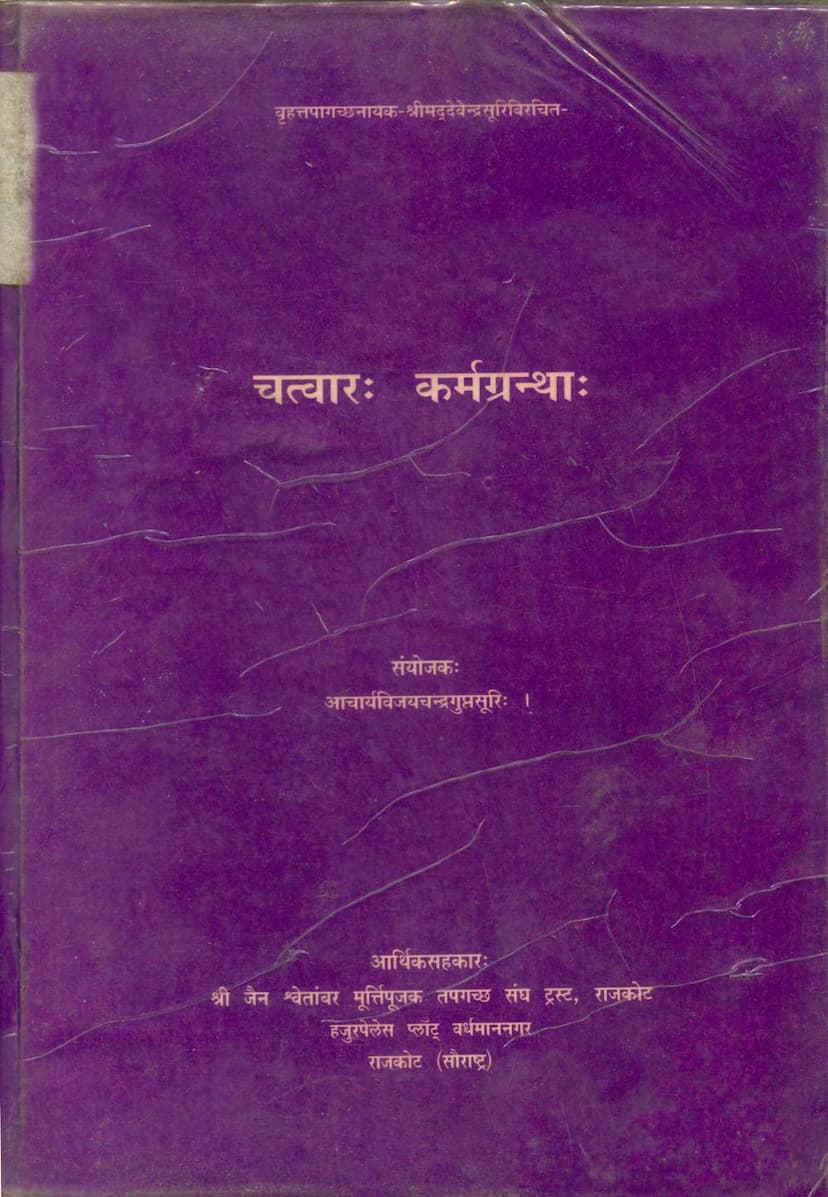Chatvar Karmgranth
Added to library: September 1, 2025

Summary
Here's a comprehensive summary of the Jain text "Chatvar Karmgranth" by Chandraguptasuri, based on the provided pages:
Title: Chatvar Karmgranth (Four Books on Karma) Author: Shrimad Devendrasuriji (Bṛhattapa-gaccha-nāyaka) Compiler/Editor: Ācārya Vijayachandraguptasūri Publisher: Jain Ātmānanda Sabhā Sponsor: Śrī Jain Śvetāmbara Mūrtipūjaka Tapa-gaccha Saṅgha Trust, Rājkot
Overview:
This document appears to be an introduction and table of contents for a collection of four "new" Karma Granthas (treatises on karma) authored by Shrimad Devendrasuri. The text highlights the importance of these works in understanding Jain philosophy, particularly the doctrine of karma, which is central to Jainism. The publication is presented as a significant contribution to Jain literature, offering a refined and annotated version of these ancient texts.
Key Aspects and Content:
-
Authorship and Lineage: The works are attributed to Shrimad Devendrasuri, a prominent Acharya of the Bṛhattapa-gaccha. The compiler, Acharya Vijayachandraguptasuri, and the sponsoring trust, Śrī Jain Śvetāmbara Mūrtipūjaka Tapa-gaccha Saṅgha Trust, Rajkot, are also mentioned, indicating a lineage and organizational effort behind this publication.
-
The "New" Karma Granthas: The title refers to "Chatvar Karmgranth" (Four Karma Books), suggesting a collection of four distinct works by Devendrasuri on the topic of karma. Page 4 clarifies that these are referred to as "new" karma granthas in contrast to older ones. It also specifies that the first, second, and fourth granthas are presented with their original commentaries (svopajña vivaraṇa), while the third grantha is accompanied by a commentary (avachūrī) written by another Acharya.
-
Significance of Karma in Jainism: Page 12 emphasizes the crucial role of karma theory in comprehending Jain Darshan and its Āgamas. It states that without understanding karma, a complete and accurate grasp of Jain philosophy is impossible. The karma granthas are presented as essential tools for this understanding.
-
The Four Karma Granthas (Devendrasuri's Works): Based on the text (specifically page 12 and subsequent content), the five karma granthas by Devendrasuri are identified as:
- Karma-vipāka: The first karma book, describing the eight types of karma (Jñānāvaraṇīya, etc.), their various classifications, and their eventual fruition (vipāka) with illustrative examples.
- Karma-stava: The second karma book, propounding the glory of Lord Mahavir through stuti (praise), elucidating the fourteen gunasthanas (stages of spiritual development), and detailing the binding, eruption, shedding, and persistence (bandha, udaya, udīraṇā, sattā) of karmic particles in each stage.
- Bandha-svāmitva: The third karma book, discussing the ownership of karma (bandha-svāmitva) in relation to various margana-sthanas (categories of existence inquiry) like gati (destiny), etc.
- Ṣaḍaśīti (Ṣaḍaśīti): The fourth karma book, which seems to be the focus of the detailed table of contents provided, covering topics like Jīvasthāna, Mārgāṇasthāna, Guṇasthāna, Upayoga, Yoga, Leśyā, Bandha, Alpa-bahutva (minority-majority analysis), Bhāva, and Saṅkhyā (enumeration). The title "Ṣaḍaśīti" likely refers to its structure related to 86 categories or topics.
- Śataka: The fifth karma book, mentioned on page 12, which deals with the nature of karmic influx (bandha), persistence (sthiti), taste (rasa), and quantity (pradesha), and classifies karmic states as fixed (dhruvabandhinī), unfixed (adhruvabandhinī), always erupted (dhruvodayā), not always erupted (adhruvodayā), always persistent (dhruvasattakā), not always persistent (adhruvasattakā), fully destructive (sarvadeśaghātī), non-destructive (aghātī), merit-making (puṇyaprakṛti), and demerit-making (pāpaprakṛti).
-
Editorial and Publication Details:
- The first edition (āvr̥tti prathamā) was published in V.S. 2053 (1996 CE) with 1000 copies.
- A previous publication (page 4) by Śrī Jain Ātmānanda Sabhā, Bhāvnagar, is noted with the date V.S. 1990 (1934 CE) and 500 copies, valued at two rupees. This earlier edition included the first, second, and fourth granthas with original commentaries and the third with another Acharya's commentary. The editor of this earlier edition was Muni Chaturvijayo, disciple of Shrimat Kantivijayaji Maharaj. The publisher was Vallabhdas Tribhuvandas Gandhi, secretary of the Jain Ātmānanda Sabhā.
- The present publication utilizes several ancient manuscripts (palm-leaf and paper) for its critical edition and provides extensive appendices.
-
Features of the New Edition:
- Correction of Errors: The text acknowledges that previous editions had significant inaccuracies despite their corrigenda. This new edition has made careful efforts to rectify these errors.
- Textual Foundation: It was compiled and researched using five ancient palm-leaf and paper manuscripts.
- Formatting: Unlike previous editions where commentaries were printed continuously, this edition breaks them into paragraphs for better readability.
- Scholarly Apparatus: The commentary diligently cites and identifies the sources of numerous scriptural references, providing their original locations where possible and noting textual variations in footnotes.
- Names in Black Type: Names of texts and authors within the commentary are presented in bold (sthūlākṣara) for easy identification.
- Appendices: The edition includes six detailed appendices covering:
- Locations of scriptural proofs cited by the commentator.
- A list of texts and authors mentioned in the commentary.
- A glossary of technical terms used in the karma granthas and their commentaries.
- A glossary of terms related to "pindaprakriti" (collective karma types).
- A list of all available Shvetambara and Digambara literature on karma.
-
Detailed Table of Contents (for Karma-vipāka, Karma-stava, Bandha-svāmitva, and Ṣaḍaśīti): The later pages (starting from page 25 onwards) provide an extensive chapter-wise breakdown of the content of the four karma granthas, detailing the specific topics covered in each chapter and the associated verses (gāthā). This includes intricate discussions on the types of karma, their permutations and combinations, the stages of spiritual progress (gunasthanas), the relationship between karma and the soul, various philosophical concepts, and the time-bound nature of karmic actions.
In essence, "Chatvar Karmgranth" is presented as a scholarly and meticulously compiled edition of Devendrasuri's seminal works on karma, offering a refined text, extensive commentaries, and valuable scholarly appendices to aid in the deep study of this crucial Jain doctrine. The introduction emphasizes the scholarly rigor and the commitment to providing an accurate and accessible version for the benefit of seekers of Jain knowledge.